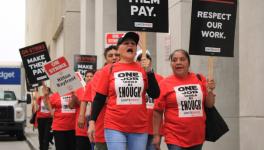France: Is The Cost of Living Protest Movement About to Erupt?
On Sunday afternoon, thousands of protesters gathered at the Place de la Nation in northeastern Paris waving signs labeled "Stop Tax Evasion" and "I want a 52% Pay Rise Just Like the CEO of Total."
The demonstrators were hoping the march against rising living costs and government inaction on climate change would mark the beginning of a nationwide protest movement.
Some analysts also think it could be the start of something much bigger and more widespread.
"We want to fight against government policies — they only ever take away money from the poorest," one man wearing a denim jacket and a yellow scarf was yelling into a microphone from the cargo area of a small truck.
"Yes," the crowd in front of him replied.
"We will participate in every action to resist against these unfair policies," Vincent Gay, the man on the truck, told DW shortly after. The 46-year-old member of Attac, an NGO fighting for social and environmental justice, added that his group was in favor of higher salaries, freezing prices for certain basic goods and decisive action against climate change.
Left is hoping for a 'combination of forces'
Attac, just like numerous other NGOs, had joined a march organized by the so-called Nupes. The left-wing alliance, which first came together for French parliamentary elections earlier this year, includes far-left party France Unbowed (LFI), France's Socialist Party, the Greens and the Communist Party. Unions hadn't officially joined the march — although the crowd included some of their members.
Nupes was also asking to bring down the pension age from 62 to 60, and calling for a basic income for young people.
LFI's former presidential candidate Jean-Luc Melenchon was in the front row among the protesters. He told journalists that the march was the first day of a cycle of protests.
"You'll experience a week like no other — this will be the combination of all forces," he said.
Then, he declared the demonstration a success, saying there had been 140,000 participants. Police later put that number at roughly 30,000.
Strikes planned for Tuesday
Melenchon had been hinting at a strike planned for this Tuesday. Unions for teachers, employees of the energy sector and employees at railroad company SNCF and Parisian metro company RATP will all participate.
This comes after weekslong strikes at the majority of France's refineries that have led to higher fuel prices and shortages. Employees there have been asking for higher wages and better working conditions.
The government now fears the march, together with the upcoming strike day, could be the start of a month-long protest movement — especially as President Emmanuel Macron's team is working on a pension reform to increase the retirement age from 62 to up to 65.
Bruno Cautres, political scientist at the Paris-based Center for Political Research at Sciences Po University, thinks such a protest wave could indeed be in the offing.
"Today's march has attracted a considerable number of participants," he told DW.
'People feel system is unjust'
"That shows how deeply unjust many people feel our system is — also, as they realize some employees are paid a lot more than others," he added. "Paradoxically, the strikes at the refineries have highlighted that as certain employees will now receive bonuses of thousands of euros."
"It might well be that that was the final straw that has now incensed the people," Cautres opined.
Danielle Tartakowsky, a Paris-based historian specialized in protest movements, also speaks of a "difficult social climate."
"The number of 'offensive' strikes in companies has been multiplying — that means people don't strike 'defensively' to prevent cuts from happening; they strike to ask for higher salaries," she told DW.
"That's extraordinary!" she added.
And yet, according to Tartakowsky, it's difficult to say if this will lead to monthslong demonstrations like the ones carried out by the so-called yellow vests, who protested for more social justice starting in November 2018.
"You just can't know what will be the spark that triggers general strikes such as the ones in the 1960s and the 1990s," she said.
France doing better than other European economies
But Philippe Crevel, a Paris-based economist and founder of think tank Cercle de l'Epargne, points out that compared to certain other countries, France's economy isn't doing that badly.
"Inflation stands at 5.6% compared to an average 10% across Europe — also because the government has been capping electricity price rises for households and subsidizing fuel prices," he explained to DW.
He added that France's GDP was predicted to grow by up to 1% next year, whereas a recession was looming in neighboring countries such as Germany.
That's why Crevel thinks the protests are primarily politically motivated: "The Left and the unions want to take a stand against Macron, but I don't think they will manage to kick off a nationwide protest movement under these circumstances," he said.
Could other people learn from the French?
But Claudine Prioul begged to differ. She had traveled to Paris from the northwestern department of Mayenne with her husband Gerard and her friend Colette Paris. All three of them are 70 years old, retirees, members of left-wing union CGT and have been participating in demonstrations since they were in their twenties.
"We need to fundamentally change our political system so that market laws are no longer the decisive factor and the government finally does what the people want," Claudine Prioul told DW.
"I'm struggling more and more to get by with my pension of €1,510 ($1,469)," she noted.
Her husband, Gerard, added that citizens of other countries could learn a thing or two from the French and also take to the streets.
"We French always think we achieve nothing with our demonstrations," he said. "But if you compare our situation with that of other countries where no one protests, we have gained much more and lost fewer rights over the past decades."
Edited by: John Silk
Get the latest reports & analysis with people's perspective on Protests, movements & deep analytical videos, discussions of the current affairs in your Telegram app. Subscribe to NewsClick's Telegram channel & get Real-Time updates on stories, as they get published on our website.

























